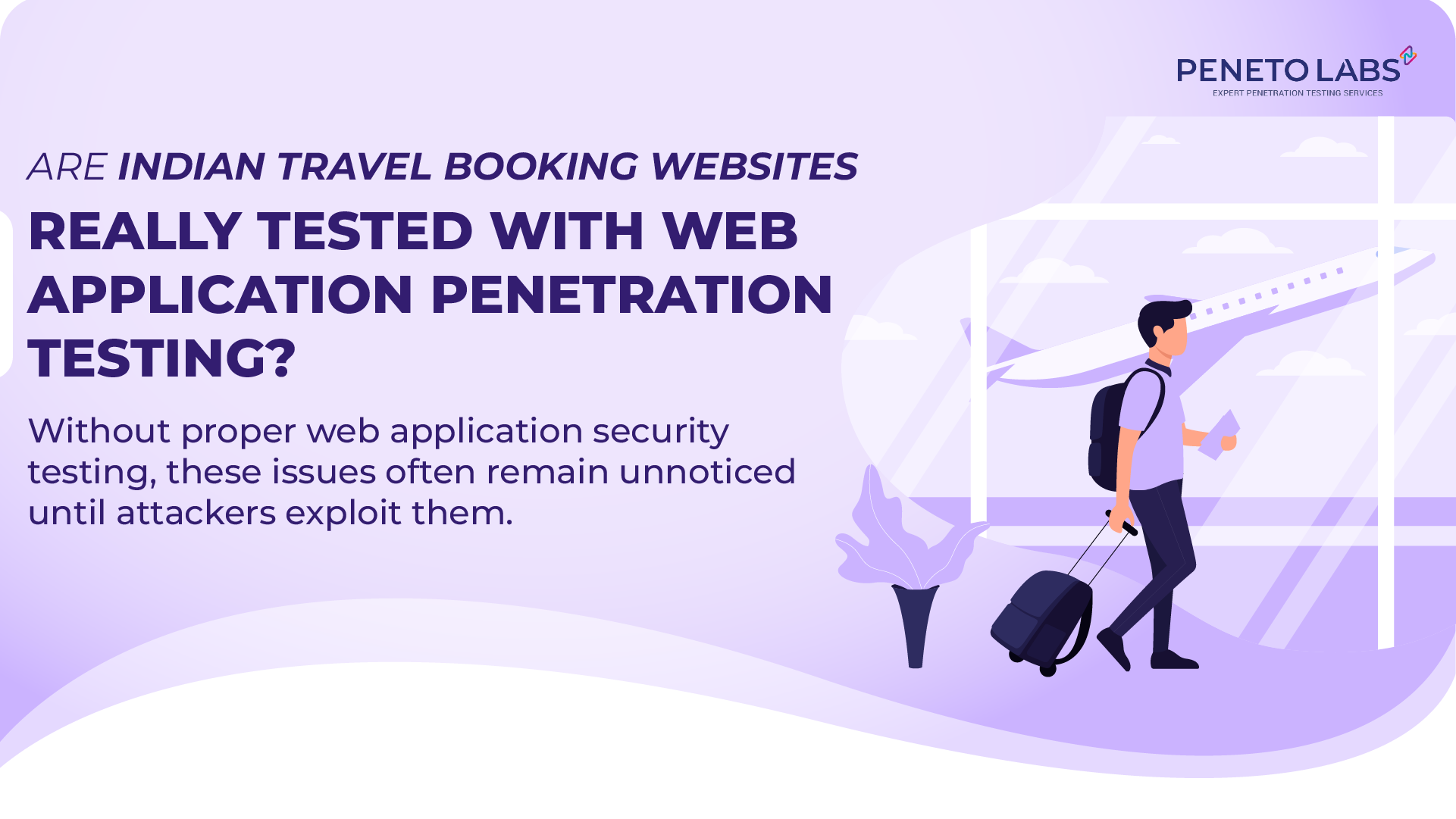Online travel booking websites help Indians plan their journeys. From booking last-minute train tickets to securing flights and hotels in just a few clicks, these platforms handle massive amounts of personal and financial data every day whose security must be maintained through Web Application Penetration Testing, so that there is no data theft or security breach.
Common Risks in Travel Booking Websites Addressed by Web Application Penetration Testing
Travel booking websites are often complex and interconnected.
Some of the biggest risks include:
- Cross-Site Scripting (XSS) on search or login pages
- SQL Injection targeting customer and booking databases
- Insecure APIs between airlines, hotels, and payment gateways
- Weak session handling that allows attackers to hijack accounts
- Misconfigured servers or cloud settings that expose sensitive data
- Outdated CMS plugins or frameworks with known vulnerabilities
Without proper web application security testing, these issues often remain unnoticed until attackers exploit them.
Importance of Web Application Penetration Testing for the Travel Companies
Travel booking websites are constantly evolving with new features, integrations, and updates. Each of these changes can introduce new vulnerabilities. That’s why web application security testing must be a continuous process.
Regular web application penetration testing helps detect issues early, ensures websites remain compliant, and keeps both customer data and business reputation safe. Thus, for travel websites, regular web application penetration testing is about more than compliance, it’s about survival on a day-to-day basis.
Here’s why:
- Protects customer trust by ensuring safe transactions
- Prevents financial fraud by securing payment processes
- Meets compliance requirements in finance and data protection
- Strengthens brand reputation in a highly competitive market
Without testing, a single breach can cost millions in recovery and permanently damage customer trust.
What Is Web Application Penetration Testing for travel websites?
For travel booking websites with multiple integrations (payment gateways, airline systems, hotel databases, and customer accounts) every integration becomes a potential entry point for attackers.
Web application penetration testing for a travel website is a simulated cyberattack performed by ethical hackers on it to identify vulnerabilities before malicious actors can exploit them. It combines manual checks, logic flaw identification, and chained exploit testing.
How Many Indian Travel Websites regularly test their platforms with web application penetration testing?
A study titled “Cyber Security Challenges and Readiness in India’s Tourism Sector” published in IJRASET reveals notable security gaps among tourism businesses in India. The findings show that only about one in five (20%) businesses update their software every month. Even fewer, just 12%, employ two-factor authentication. Likewise, of the 15 government tourism portals reviewed, only four undergo regular security audits.
While leading travel portals invest heavily in security, many mid-size and upcoming platforms focus more on adding features and improving user experience; leaving security gaps.
Too often, web application penetration testing is treated as a checkbox activity, something done once before launch, instead of being a continuous security practice. This creates dangerous blind spots. A missed software patch, insecure third-party integration, or weak password policy can all lead to breaches.
Why Security Matters for Travel Websites?
When you book a trip online, you trust a website with highly sensitive data including your name, ID proof, payment details, and even travel preferences. For cybercriminals, this is a treasure trove. A single breach can result in:
- Credit card fraud through stolen payment information
- Identity theft from leaked IDs or passport numbers
- Account takeover due to weak authentication loopholes
- Massive reputation loss for the travel brand itself
This is why web application security testing is essential for travel websites. Without it, travel websites risk losing customer trust and business continuity.
Peneto Labs: Trusted Experts in Travel Website Security
At Peneto Labs, we understand the unique security challenges faced by travel booking websites in India. As a cybersecurity company with deep technical expertise, we specialize in web application penetration testing tailored for high-transaction platforms like travel portals.
Our certified pentesters (OSCP, OSCE, GCIH, GWAPT) combine manual and automated testing to uncover complex vulnerabilities, including API flaws, chained exploits, and logic gaps that scanners often miss.
Whether you’re a leading OTA, a niche travel startup, or an integrated platform, Peneto Labs helps you safeguard sensitive data and customer trust.
Final Thoughts
As Indian travelers increasingly book online, the responsibility on travel websites to ensure security grows stronger. The reality is that not every travel site undergoes rigorous web application penetration testing but those that do stand out in terms of trust, safety, and long-term growth.
If you’re building or running a travel booking website, the smartest investment you can make today is in professional web application security testing. It safeguards your customers, strengthens your brand, and ensures your platform is future ready.
